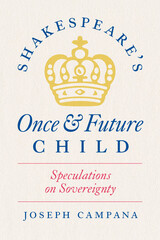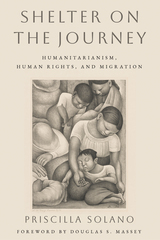7 books about John Henry Newman

A Guide to John Henry Newman
His Life and Thought
Juan R. Velez
Catholic University of America Press, 2022
John Henry Newman (1801-1890), renowned thinker and writer, Anglican clergyman and later Roman Catholic priest and cardinal, has had a lasting influence on both Anglicans and Catholics, in the fields of literature, education, and theology. On October 13, 2019, Pope Francis declared him a saint in Rome.
Appealing to both the student and the scholar, A Guide to John Henry Newman provides a wide range of subjects on Newman’s life and thought relevant for our times and complementary to biographies of Newman. The contributors include authors from many different disciplines such as theology, education, literature, history, and philosophy, highlighting the wide range of Newman’s work. These authors offer a positive assessment of Newman’s thought and contribute to the discussion of the recent scholarship of others.
A Guide to John Henry Newman will interest educated readers and professors alike, and serve as a text for college seminars for the purpose of studying Newman.
[more]
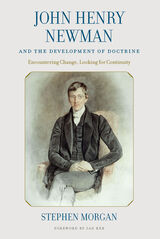
John Henry Newman and the Development of Doctrine
Encountering Change, Looking for Continuity
Stephen Morgan
Catholic University of America Press, 2022
John Henry Newman and the Development of Doctrine provides an analysis of the attempts by John Henry Newman to account for the historical reality of doctrinal change within Christianity in the light of his lasting conviction that the idea of Christianity is fixed by reference to the dogmatic content of the deposit of faith. It argues that Newman proposed a series of hypotheses to account for the apparent contradiction between change and continuity, that this series begins much earlier than is generally recognized and that the final hypothesis he was to propose, contained in An Essay on the Development of Christian Doctrine, provides a methodology of lasting theological value and contemporary relevance.
Stephen Morgan establishes the centrality of the problem of change and continuity in theology, to Newman's theological work as an Anglican, its part in his conversion to Catholicism and its contemporary relevance to Catholic theology. It also surveys the major secondary literature relating to the question, with particular reference to those works published within the last fifty years. Additionally, Morgan considers the legacy of the Essay as a tool in Newman’s theology and in the work of later theologians, finally suggesting that it may offer a useful methodological contribution to the contemporary Catholic debate about hermeneutical approaches to the Second Vatican Council and post-conciliar developments in doctrine.
[more]

John Henry Newman on Truth and its Counterfeits
A Guide for Our Times
Reinhard Hutter
Catholic University of America Press, 2020
Reinhard Hütter’s main thesis in this third volume of the Sacra Doctrina series is that John Henry Newman, in his own context of the nineteenth century, a century far from being a foreign one to our own, faced the same challenges as we do today; the problems then and now differ in degree, not in kind. Hence, Newman's engagement with these problems offers us a prescient and indeed prophetic diagnosis of what these problems or errors, if not corrected, will lead to—consequences which have more or less come to pass—and, furthermore, an alternative way which is at once thoroughly Catholic and holds contemporary relevance.
The introduction offers a survey of Newman’s life and works and each of the subsequent four chapters addresses one significant aspect of Christianity that is not only contested or rejected by secular unbelief, but also has a counterfeit for which not only Christians, but even Catholics have fallen. The counterfeit of conscience is the “conscience” of the sovereign subject (Ch. 1); the counterfeit of faith is the “faith” of one who does not submit to the living authority through which God communicates but rather adheres to the principle of private judgment in matters of revealed religion(Ch.2); the counterfeit of doctrinal development is twofold: (i) paying lip service to development while only selectively accepting its consequences on the grounds of a specious antiquarianism and (ii) invoking development theory to justify all sorts of contemporary changes according to the present Zeitgeist (Ch. 3). Finally, the counterfeit of the university are all those “universities” whose end is not to educate and thereby to perfect the intellect, but rather to feed more efficiently the empire of desire that is informed by the techno-consumerism of today (Ch. 4). The book concludes with an epilogue on Hütter’s journey to Catholicism.
[more]
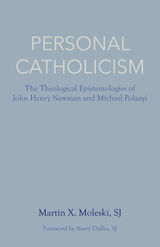
Personal Catholicism
The Theological Epistemologies of John Henry Newman and Michal Polanyi
Martin X. Moleski
Catholic University of America Press, 2020
"Both Newman and Polanyi rank high among the pioneers in the history of the post-critical movement in epistemology. They pointed out the limitations of the methods that had become current since the time of Descartes and Spinoza. . . . The systems of these two authors are exceptionally useful for dealing with the major issues that trouble the theological climate today."—From the Foreword by Avery Dulles, S.J.
"This engaging and lucid study brings into dialogue two thinkers whose methods share much in common despite their different purposes. . . . A principal contribution of Moleski's study is its cultivation of the common ground that religion shares with science."—Theological Studies
"An important and utterly engaging study. . . . Those familiar with Newman's Grammar of Assent and Polanyi's Personal Knowledge will appreciate the ways in which Moleski makes sometimes unexpected connections between the two thinkers, despite Polanyi's critical disposition toward Catholicism. Personal Catholicism is a most welcome contribution to today's rethinking of the relationship between faith and reason."—First Things
"There is a wealth of material here that could be applied to issues of faith and reason, science and faith, faith and the nature of reality as they are raised in contemporary society. . . ."—The Gospel and Our Culture
[more]
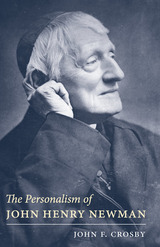
The Personalism of John Henry Newman
John Crosby
Catholic University of America Press, 2014
In The Personalism of John Henry Newman, Crosby shows the reader how Newman finds the life-giving religious knowledge that he seeks. He explores the "heart" in Newman and explains what Newman was saying when he chose as his cardinal's motto, cor ad cor loquitur (heart speaks to heart). He explains what Newman means in saying that religious truth is transmitted not by argument but by "personal influence."
[more]
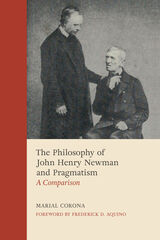
The Philosophy of John Henry Newman and Pragmatism
A Comparison
Marial Corona
Catholic University of America Press, 2023
In recent years, interest in John Henry Newman as a philosopher has gained momentum. This work places his philosophical insights in conversation with philosophers from the pragmatic tradition, particularly with C. S. Peirce, the classical pragmatists, and those who have followed their line, and shows several lines of concurrence. It argues that Newman overcame the modern philosophy of his time by reconnecting to the Aristotelian tradition in a very similar way to how Peirce did it fifty years later and the new pragmatists a century after.
Without claiming that Newman is a pragmatist philosopher, pragmatism is used as a foil, or point of access, to delve into Newman’s philosophy and bring forth the richness of his thought while placing him in the canon of philosophy. This approach deepens the understanding of his philosophical contributions and widens their reach to circles that have previously not engaged with him. Further, this study provides a means to understand pragmatism’s resources from a seldom-used vantage point and perhaps appreciate its fruitfulness in a new way.
Much emphasis is placed in Newman’s texts that refer to his search for and commitment to the truth. The particular nuances of his thought that are brought to light showcase the effective intellectual resources that his writings contain. Newman does not provide ready-made answers to today’s questions, but the way he analyzes and engages with the quandaries of his time can point us to creative and fruitful ways of engaging with those of our times.
[more]
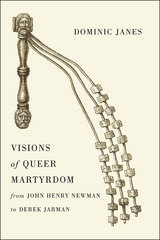
Visions of Queer Martyrdom from John Henry Newman to Derek Jarman
Dominic Janes
University of Chicago Press, 2015
With all the heated debates around religion and homosexuality today, it might be hard to see the two as anything but antagonistic. But in this book, Dominic Janes reveals the opposite: Catholic forms of Christianity, he explains, played a key role in the evolution of the culture and visual expression of homosexuality and male same-sex desire in the nineteenth and twentieth centuries. He explores this relationship through the idea of queer martyrdom—closeted queer servitude to Christ—a concept that allowed a certain degree of latitude for the development of same-sex desire.
Janes finds the beginnings of queer martyrdom in the nineteenth-century Church of England and the controversies over Cardinal John Henry Newman’s sexuality. He then considers how liturgical expression of queer desire in the Victorian Eucharist provided inspiration for artists looking to communicate their own feelings of sexual deviance. After looking at Victorian monasteries as queer families, he analyzes how the Biblical story of David and Jonathan could be used to create forms of same-sex partnerships. Finally, he delves into how artists and writers employed ecclesiastical material culture to further queer self-expression, concluding with studies of Oscar Wilde and Derek Jarman that illustrate both the limitations and ongoing significance of Christianity as an inspiration for expressions of homoerotic desire.
Providing historical context to help us reevaluate the current furor over homosexuality in the Church, this fascinating book brings to light the myriad ways that modern churches and openly gay men and women can learn from the wealth of each other’s cultural and spiritual experience.
Janes finds the beginnings of queer martyrdom in the nineteenth-century Church of England and the controversies over Cardinal John Henry Newman’s sexuality. He then considers how liturgical expression of queer desire in the Victorian Eucharist provided inspiration for artists looking to communicate their own feelings of sexual deviance. After looking at Victorian monasteries as queer families, he analyzes how the Biblical story of David and Jonathan could be used to create forms of same-sex partnerships. Finally, he delves into how artists and writers employed ecclesiastical material culture to further queer self-expression, concluding with studies of Oscar Wilde and Derek Jarman that illustrate both the limitations and ongoing significance of Christianity as an inspiration for expressions of homoerotic desire.
Providing historical context to help us reevaluate the current furor over homosexuality in the Church, this fascinating book brings to light the myriad ways that modern churches and openly gay men and women can learn from the wealth of each other’s cultural and spiritual experience.
[more]
READERS
Browse our collection.
PUBLISHERS
See BiblioVault's publisher services.
STUDENT SERVICES
Files for college accessibility offices.
UChicago Accessibility Resources
home | accessibility | search | about | contact us
BiblioVault ® 2001 - 2024
The University of Chicago Press




